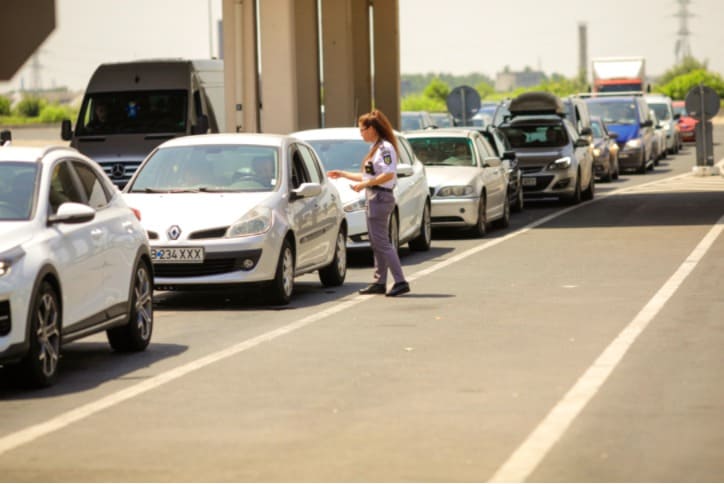How to get Schengen visa travel insurance for Italy?
PRO-TIP: Travel Insurance is mandatory for your Schengen visa to Italy!
Written by the AXA Schengen team
Date : 08/20/2025
With an average of 60+ million international visitors each year, Italy ranks as the fifth most visited country on the planet. And between its rich cultural history, breathtaking manmade and natural landscapes and sites, and unparalleled, world-class cuisine, it’s no wonder why. But whether you’re gazing up at the Sistine Chapel, exploring Roman ruins, shopping in Milan, or simply sunbathing in Sicily, you want to be sure that your Italian getaway is a safe one..
And that’s where travel insurance comes in. Because not only can the right travel insurance plan for Italy guarantee a safe and worry-free journey from beginning to end. But also because, if you first need a visa for Italy to realize your dream journey - proper travel insurance is a mandatory requirement.
Which is why travel insurance maestros AXA have all you need to know about it below!
- Is travel insurance mandatory for Italy?
- What are the travel insurance requirements to be granted a Schengen visa for Italy?
- I don’t need a Schengen Visa for Italy. Do I still need travel insurance?
- Why choose AXA travel insurance for Italy?
- What travel insurance options for Italy (and/or a Schengen visa) does AXA offer?
- What should I do if I am injured or ill while in Italy?
- What else should I know when prepping for my trip to Italy?
Is travel insurance mandatory for Italy?
If you need a Schengen visa to visit Italy, then yes. Because not only is Italy the birthplace of Da Vinci, Micahelaengelo, Armani, Bellucci, pizza, and - in part - the European Union. But, like most EU nations, it is also one of Europe’s dozens of Schengen countries.
And even though the Schengen Zone allows visa-free European travel for all of its members within its many borders, most non-Schengen nationals require a Schengen visa to visit it (for stays of up to 90 days in any 180-day period, that is).
To be granted a Schengen Visa, meanwhile - be it for Italy or any of its Schengen neighbors - you need to have the proper travel insurance (more on that below).
So, let’s clarify:
Which travelers are required to apply for a Schengen visa to visit Italy (for stays of less than 90 days*)?
Citizens of any nation that doesn’t have a visa-waiver agreement with the European Union and the Schengen Zone need a Schengen visa for Italy (and, therefore, the appropriate health travel insurance) to come to Italy.
This applies to nationals of over 100 countries worldwide - including China, India, Russia, any African nation, and most of the Middle East.
Which travelers don’t need a Schengen visa to visit Italy (for stays of less than 90 days*)?
On the other hand, you don’t need a Schengen visa for Italy (or the rest of the Schengen) if you are:
-A national of the Schengen area or the EU;
-A holder of a valid residence permit issued by a Schengen Area member country;
-A national of a non-Schengen European Union member country (like Cyprus or Ireland)
-A national of a non-EU country (and/or territory) that has signed a visa exemption agreement with the EU. Of these there are roughly 60 - with Australia, Brazil, Canada, Hong Kong, Japan, Mexico, the U.K., and the U.S. being among the most popular.
*PRO-TIP: AXA can also help you understand the Schengen visa 90/180-day rule in no time too!
So… Do I need a visa for Italy?
If you’re still not sure where you stand, fear not. First off, the European Commission’s official website offers full lists of countries exempt and not exempt from the Schengen visa (and other helpful visa info to better plan your Italian voyage).
But we here at AXA can also easily help you answer the following:
Do I need a Schengen visa?
How do I apply for a visa for Italy?
And if you do, we’ve already done most of the Italian legwork for you too (and no matter where you’re coming from)! Just click around below to learn exactly:
How do I get a Schengen visa for Italy?
How do I get a Schengen visa for Italy from the UK (post-Brexit)?
How do I get a Schengen visa for Italy from India?
Plus, we can also help you understand:
What type of Schengen visa for Italy do I need?
How much does a Schengen visa for Italy cost?
How long does it take to process an Italian (or any other) Schengen visa?
In short, while Schengen travel insurance happens to be our strong suit, AXA knows Schengen visas like the back of its hand too. So explore!
What are the travel insurance requirements to be granted an Italian visa?
But before Italy even considers your visa, you’re going to need a solid travel insurance plan. After all, having one is among the primary (and mandatory) requirements for being granted a Schengen visa - and that’s no matter your Schengen destination(s).
Moreover, according to the European Commission, not just any plan will do. Rather, your Italy visa travel insurance must:
- be purchased from an insurance company validated by the consular authorities of all Schengen countries
- have a minimum coverage of €30,000 in medical expenses (such as hospitalization, emergency treatment, and repatriation — including in case of death);
- cover you in all the Schengen member countries (and not just Italia)
- be valid for the entire duration of your stay in the Schengen Area.
The good news? All of AXA’s plans (see below) meet all the criteria above - and then some!
PRO-TIP: And for the really curious, we’ve got more about the travel insurance requirements for a Schengen visa (and reasons behind them) too!
I don’t need a Schengen Visa for Italy. Do I still need travel insurance?
Now, if you’re fortunate enough to be able to travel to Italy Schengen-visa-free, travel insurance isn’t legally required (and is, therefore, optional). But that still doesn’t mean it’s something you should skip!
Italy is known for both its excellent healthcare system and generally safe environment. Nevertheless, accidents and unexpected health issues can catch travelers off guard anywhere. And whether you’re wandering through historic cities like Rome, exploring vineyards in the scenic Italian countryside, or simply relaxing along the Amalfi Coast, being uninsured can lead to an unforgettable experience of the not-so-fun variety..
Healthcare services for non-Schengen-residents may result in surprisingly significant bills too. Especially if you have a preexisting condition, face emergencies, need prescriptions, and so on.
Plus, navigating the Italian healthcare system can be challenging, time-consuming, and nerve-racking. And even more so if you’re not familiar with the language or local procedures.
Having reliable travel insurance, on the other hand, means you’ll have both general support 24/7 and emergency assistance when you need it most. Not to mention the best possible way to avoid unnecessary stress, unforeseen delays, and unexpected expenses.
In short, with the right travel insurance coverage, you can focus on savoring Italy’s incredible culture, food, and landscapes with peace of mind, knowing expert help is always just a call away.
Why choose AXA travel insurance for Italy?
And on that note, here are just reasons why AXA is your number one choice to experience Italy stress-free and in style. Our plans:
- Offer a quick, easy, and hassle-free online subscription
- Have no age limit, zero deductibles, and require no medical exams
- Are accepted by all Italian (and all other Schengen) embassies, consulates, and visa application centers worldwide
- Provide the certified, world-recognized AXA travel insurance certificate instantly upon purchase (via email) - which you can then use at the aforementioned embassies, etc.
- Offer a full refund in case your Italian Schengen visa application is denied
- Offer coverage of medical expenses and repatriation costs of up to €1 Million or even €2 Million
- Include both civil liability and personal liability insurance
- Include death and/or disability coverage
- Offer baggage insurance (included or optional, depending on the plan)
- Offer customizable plans with multiple upgrade options
- Are valid for the Schengen area + the European Union + the United Kingdom (depending on the plan, that is - see below)
- Offer duration flexibility - from just one day, up to six months, or up to a full year
- Provide 24/7 emergency assistance
- Offer free remote medical consultation (in English and a number of other languages) with our unique Doctor, Please! feature
- Can be purchased on behalf of someone else
Not only that, but with AXA, you also get the peace of mind of knowing you’re supported by a world-renowned, decades-trusted, first-class Schengen travel insurance brand!
What travel insurance options for Italy (and/or a Schengen visa) does AXA offer?
In terms of the actual coverage options AXA offers, here’s what you have to choose from when planning your Italian journey (don’t be afraid to click around!):
-AXA SCHENGEN BASIC: our standard coverage meets all the requirements for your Schengen visa and is simple yet reliable (and world-recognized).
AXA BASIC and covers you in all Schengen countries + European microstates (San Marino, Andorra, Monaco, and Vatican City).
-AXA SCHENGEN ESSENTIAL: complete, reliable, affordable European coverage that meets all EU/Schengen visa requirements and covers you in all Schengen countries + all EU countries + the European microstates above + the UK.
-AXA SCHENGEN PREMIUM: our premium, all-inclusive coverage also meets all necessary Schengen visa requirements, and also covers you in all Schengen countries + all EU countries + the European microstates + the UK.
It is designed for those travelers who want to opt for completely zero-stress and worry-free travel.
-AXA SCHENGEN ANNUAL: our annual plan is best suited for frequent travelers and/or holders of multiple-entry visas.
It meets all visa requirements while providing coverage across all Schengen countries + all EU countries + the microstates + the UK.
But on top of all that, it offers a single contract for a full year of European travel!
So whether booking that ticket or visa appointment, make sure you first take a minute to
and
With AXA’s various comprehensive plans, adjustable options, and countless overall benefits, you’re sure to have a buon viaggio indeed!
What should I do if I am injured or ill while in Italy?
No matter where in Italy (or anywhere else in the Schengen) you happen to be, safety’s not a guarantee. So if things do go wrong - stay calm, breathe, and know that AXA’s got your back.
In case of a medical emergency, simply contact the AXA Schengen call center at the number provided on your insurance policy.
Our certified medical assistance professionals are standing by to answer your questions and advise you 24/7.
And if need be, we’ll also help you find the medical center closest to your location (and best suited to your situation).
What to Provide When Contacting AXA's Call Center
When you call, our team will ask you for:
-The number of your policy (which begins with “SCH”);
-An address and telephone number at which you can be reached (as well as the details of any people that can be contacted locally);
-Your dossier number (communicated at the time of the first call).
IMPORTANT: And remember to keep all bills/invoices and enclose them with your file as needed. Oh, and keep that phone charged too.
Emergency numbers in Italy
While AXA is standing by, here are the other essential emergency numbers to know while in Italy too:
- General emergency: 112
- Police (Carabinieri and Polizia): 112 or 113
- Medical emergency and ambulance: 118
- Fire brigade: 115
Fortunately, Italy’s emergency services are well-coordinated - and 112 works both there and across the European Union (as the primary emergency number). But for non-urgent police matters, 113 is also widely used - particularly in larger cities.
What else should I know when prepping for my trip to Italy?
And, finally, AXA has also gone ahead and gathered a few final general pointers to make sure your Italian getaway goes as smoothly as possible
Safety
Italy remains a popular destination for millions, combining rich history, art, and stunning coastlines. And while violent crime against tourists is rare, petty crimes such as pickpocketing, purse snatching, and scams, unfortunately, occur frequently. This is especially true in busy tourist hubs like Rome, Venice, Florence, and Milan.
So pay close attention to your belongings in crowded places such as public transport, sightseeing hotspots, and markets. Avoid flaunting valuables to reduce attention. And be mindful of cyber-crime too (ATM machines, email scams, etc.).
Weather
Italia enjoys a Mediterranean climate with warm, dry summers averaging 25–30°C (77–86°F) along the coast. Winters are mild and wet, typically around 8–15°C (46–59°F). Northern regions - especially the Alps and Apennines - see colder winters and occasional snow. While Rome and the coast can be scorchers in the summer. So when packing, consider layers - and be prepared for these regional differences.
Currency
Italy is part of the Eurozone and, therefore, uses the euro (€). Euros are widely accepted throughout the country in both cash and card form, though smaller shops and markets in rural or tourist areas often prefer cash.
Public Transportation
Italy’s major cities feature extensive public transit systems, including metros in Rome, Milan, and Naples - alongside buses and trams (which can be found in most other cities too).
Trains connect cities and towns efficiently, from high-speed routes (like via Italotreno) to regional lines.
PRO-TIP: But watch out for pickpockets on crowded trains and bus stations.
Scooters and e-bikes are everywhere too (so be careful!). And official taxis and ride-hailing apps are also readily available.
Opening Hours
Shops and supermarkets generally open from 9 AM until 7 or 8 PM Monday through Saturday. Most, however, close or have limited hours on Sundays (particularly in smaller towns). Tourist attractions often have longer opening hours during peak season, of course, but may close for one weekday. So check ahead (and ask) to avoid disappointments!
Driving License
Visitors driving in Italy must carry a valid driver's license. If your license is not issued in Italian or English, it's strongly recommended to have an International Driving Permit (IDP) as well. Strict enforcement of traffic rules and speed limits applies- especially on narrow mountain roads and in historic city centers.
PRO HEADS-UP: Many Italian cities have what’s known as Limited Traffic Zones (aka ZTLs, or “Zona a Traffico Limitato”) - i.e., restricted areas where unauthorized vehicles are not allowed in order to reduce congestion and pollution. And entering one without permission often results in fines - so make sure to check local signs and regulations carefully!
PRO-TIP: And the Italian government’s official road authority page has more detailed info on driving in Italy.
Dining
Restaurants typically serve lunch from 12 PM to 2:30 PM and dinner from 7 PM to 10 or 11 PM. Meals are leisurely affairs, and local specialties vary dramatically by region (and are all but amazing!). Make reservations during high season or weekends, especially in major tourist cities.
Cultural Etiquette
Italy prizes social harmony and respect for tradition. So little things like dressing neatly in churches and historic sites and showing patience during slower-paced dining or shopping experiences will greatly enhance your trip. And, of course, a warm “Buongiorno” or “Grazie” can go a long way too.
Italy’s Official Tourism Website and ENIT also have plenty of travel guides, practical tips, event calendars, and everything else you might need to prepare for a safe and unforgettable Italian adventure.
PRO-TIP: And safety and peace-of-mind pros AXA - along with ensuring your adventure is a safe one - also happens to have its very own safety guide on Italy too:
Related articles :
- Going to Italy: Travel and safety advice
- How much does Schengen travel insurance cost?
- How can I choose the best Schengen travel insurance for my trip?
FAQ
Can I take out AXA Schengen travel insurance for Italy on behalf of someone else?
Yes, AXA allows you to purchase travel insurance for loved ones or guests with no problem. You'll just need to provide their personal info (i.e., their DOB, address, passport number, and itinerary) - and they’re good to go too!
What happens if my travel insurance plan doesn’t meet Schengen visa rules?
If your travel insurance doesn’t meet the necessary Schengen visa requirements, your visa application will be denied. Moreover, your visa fees won’t be refunded (be it for Italy or anywhere else).
PRO-REMINDER: However, if your visa is refused, AXA - while fully complying with all Schengen visa rules - does offer a full refund of your insurance premium!
Does an Italian Schengen Visa allow travel anywhere in Europe?
Not necessarily. It does allow travel to all other Schengen countries (and AXA is there with you every step of the way). However, there are roughly 50 countries in all of Europe - and not all of them are in the Schengen Zone.
FINAL PRO-TIP: But fear not - to make sure you know where you’re going, AXA can tell you all about the key differences between Europe, the European Union, the EEA, and the Schengen Zone too!




